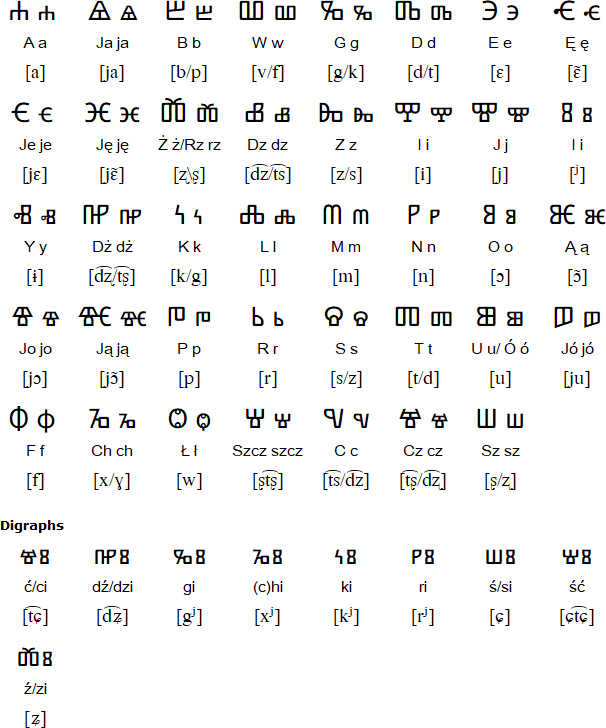Głagolicy (original) (raw)
Głagolicy is a way to write Polish with the Glagolitic alphabet - one of the oldest known scripts created to write Slavic languages. It was devised by Allison Powell, who believes that the Latin alphabet is poorly adapted for writing Polish as it lacks many of the Slavic phonemes naturally occurring in this language. The end result leads to long, cumbersome words with several letters needed to achieve Polish phonemes and a slew of messy diacritics that often leave words looking daunting and unsightly.
Głagolicy is intended to write the Polish language in a way that is aesthetically appealing and visually impressive. It just so happens that the letters that make up the Glagolitic script are a nearly perfect match of the phonemes found in Polish, making it an ideal script to write the language.
Even using the Cyrillic script for Polish would involve having to rely on a lot of obsolete letters not typically used in modern Cyrillic scripts since Polish phonology has preserved many sounds that have disappeared from other Slavic languages - the most notable example being nasalized vowels. Głagolicy has all the letters necessary to suit the many preserved archaic sounds (such as nasalization) of the Polish language.
Notable features
- Type of writing system: alphabet
- Writing direction: right to left in horizontal lines
- Used to write: Polish
- The name Głagolicy means Glagolitic in Polish
Głagolicy

Download an alphabet chart for Głagolicy (Excel)
Notes
- ⱘ = [o] before ⰾ or ⱉ. When followed by plosive consonants (ⰱ, ⱂ, ⰳ, ⰽ, ⰴ, ⱅ) or affricate consonants (ⰶ, ⱎ, ⰸ, ⱄ, ⰼ, ⱍ, ⱋ), ⱘ is pronounced [ɔn], [ɔŋ], or [ɔm]. For example, ⰸⱘⰱ (ząb) = [zɔmp]
- ⱕ = [e] before ⰾ or ⱉ or at the end of a word. When followed by plosive consonants (ⰱ, ⱂ, ⰳ, ⰽ, ⰴ, ⱅ) or affricate consonants (ⰶ, ⱎ, ⰸ, ⱄ, ⰼ, ⱍ, ⱋ), ⱕ is pronounced [ɛn], [ɛŋ], or [ɛm]. For example, ⱅⱕⱍⰰ (tęcza) = [tɛnt͡ʂa]
- Voiced consonants (ⰱ, ⰲ, ⰳ, ⰴ, ⰶ, ⰷ, ⰸ, and ⰼ) can become unvoiced at the end of words or end in clusters with unvoiced consonants. For example, ⱃⱆⰳ (róg) = [ruk].
- Unvoiced consonants (ⰽ, ⱂ, ⱄ, ⱅ, ⱈ, ⱌ, ⱍ and ⱎ) can become voiced in clusters with voiced consonants. For example, ⱅⰰⰽⰶⰵ (także) = [tagʐɛ].
- The letter ⰻ has no sound value of its own. The letter ⰻ is used to palatalize consonants such as ⱍ, ⰼ, ⰳ, ⱈ, ⰽ, ⱀ, ⱎ, ⰶ and ⱋ, giving them “soft sounds'' when these letters are preceded by ⰻ.
- Some of the Glagolitic letters have been slightly modified to suit and match Polish phonemes. However, the Głagolicy script was intended to remain as convervative and true to the original script as possible
Sample text in Głagolicy
Ⰲⱎⱏⱄⱌⱏ ⰾⱆⰼⰻⰵ ⱃⱁⰷⱘ ⱎⰻⱔ ⰲⱁⰾⱀⰻ ⰹ ⱃⱆⰲⱀⰻ ⰲ ⱄⰲⱁєⰺ ⰳⱁⰴⱀⱁⱎⰻⱍⰻ ⰹ ⱂⱃⰰⰲⰰⱈ. Ⱄⱘ ⱁⰱⰴⰰⰶⰵⱀⰹ ⱃⱁⰸⱆⰿⰵⰿ ⰹ ⱄⱆⰿⰻⰵⱀⰻⰵⰿ ⰹ ⱂⱁⰲⰹⱀⱀⰻ ⱂⱁⱄⱅⱔⱂⱁⰲⰰⱍⰻ ⰲⱁⰱⰵⱌ ⱎⰻⰵⰱⰻⰵ ⰲ ⰴⱆⱈⱆ ⰱⱃⰰⱅⰵⱃⱄⱅⰲⰰ.
Transliteration
Wszyscy ludzie rodzą się wolni i równi w swojej godności i prawach. Są obdarzeni rozumem i sumieniem i powinni postępować wobec siebie w duchu braterstwa.
Translation
All human beings are born free and equal in dignity and rights. They are endowed with reason and conscience and should act towards one another in a spirit of brotherhood.
(Article 1 of the Universal Declaration of Human Rights)
Information about Polish | Phrases | Numbers | Time | Terms of endearment | Tongue twisters | Tower of Babel | Learning materials
Information about the Glagolitic alphabet
Adapted scripts by Allison Powell
Bhalabali,Głagolicy,Inglisuraya, Jawacaraka,Nasema,Qurditsuraya
Constructed scripts for: Ainu | Arabic | Chinese languages | Dutch | English | Hawaiian | Hungarian | Japanese | Korean | Lingala | Malay & Indonesian | Persian | Tagalog / Filipino | Russian | Sanskrit | Spanish | Taino | Turkish | Vietnamese | Welsh | Other natural languages | Colour-based scripts | Tactile scripts | Phonetic/universal scripts | Constructed scripts for constructed languages | Adaptations of existing alphabets | Fictional alphabets | Magical alphabets | A-Z index | How to submit a constructed script
[top]
You can support this site by Buying Me A Coffee, and if you like what you see on this page, you can use the buttons below to share it with people you know.
If you like this site and find it useful, you can support it by making a donation via PayPal or Patreon, or by contributing in other ways. Omniglot is how I make my living.
Note: all links on this site to Amazon.com


[top]


